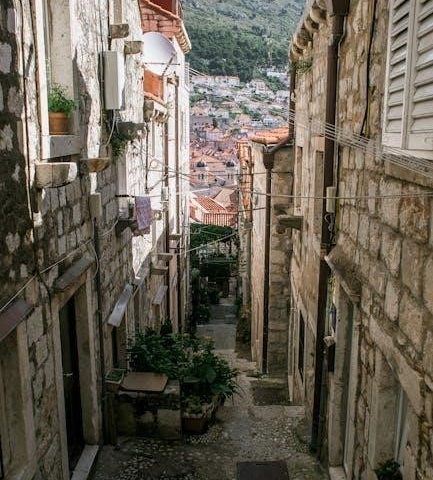Lynn Nottage’s Pulitzer Prize-winning play, Ruined, explores the lives of women in war-torn Congo, blending harsh realities with resilience, set in Mama Nadi’s brothel.
1.1 Overview of the Play
Ruined, a Pulitzer Prize-winning play by Lynn Nottage, is set in a brothel during the civil war in the Democratic Republic of Congo. The story revolves around Mama Nadi, the brothel owner, and the women who find refuge there, exploring themes of survival, resilience, and the harsh realities of war. The play masterfully balances the brutality of conflict with moments of hope and humanity.
1.2 Historical Context of the Democratic Republic of Congo
The play is set during the civil war in the Democratic Republic of Congo, a conflict marked by brutal violence, resource exploitation, and widespread human rights abuses. The war involved multiple armed groups, often fighting over valuable resources like coltan, leading to immense suffering, displacement, and gender-based violence, which deeply impacts the lives of women portrayed in the play.
1.3 The Significance of the Title “Ruined”
The title Ruined reflects the physical and emotional devastation of women in war-torn Congo, highlighting their resilience amidst destruction. It symbolizes the loss of innocence, dignity, and security, while also underscoring their survival and strength in the face of unimaginable hardship.
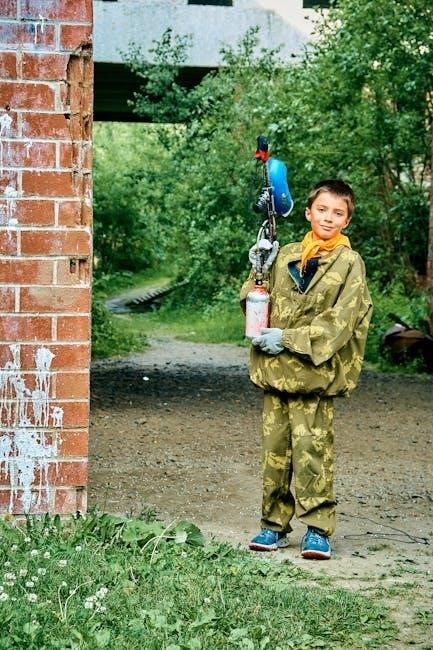
Key Themes in “Ruined”
Central themes include survival, resilience, gender power dynamics, and the devastating impact of war on civilians, highlighting women’s struggles and strength.
2.1 Survival and Resilience of Women in War
The play vividly portrays women’s survival tactics in a war-torn Congo, emphasizing their resilience amidst sexual violence and exploitation. Through characters like Salima and Sophie, Nottage highlights their strength and adaptability, showing how they navigate a brutal environment while clinging to hope and humanity. Their stories underscore the emotional and physical toll of conflict.
2.2 Gender and Power Dynamics
The play examines the complex interplay of gender and power in a war-torn society, where women are both exploited and empowered. Mama Nadi’s brothel serves as a microcosm of these dynamics, highlighting how women navigate survival amidst societal and patriarchal constraints. The characters’ struggles and choices reveal the broader systemic inequalities faced by women in conflict zones.
2.3 The Impact of War on Civilians
Ruined vividly portrays the devastating effects of war on civilians, particularly women and children. The play highlights displacement, sexual violence, and emotional trauma, illustrating how conflict disrupts ordinary lives. Through characters like Salima and Sophie, Nottage exposes the human cost of war, emphasizing resilience and survival amidst unimaginable suffering.
Main Characters in “Ruined”
Mama Nadi, the brothel owner, Salima, a rape victim, Sophie, a traumatized girl, Christian, a salesman, and Josephine, a strong prostitute, drive the story’s emotional depth.
3.1 Mama Nadi: The Brothel Owner
Mama Nadi, the enigmatic proprietor of a brothel in war-torn Congo, balances ruthlessness with maternal instincts. She shelters women like Salima and Sophie while navigating the conflict’s chaos, embodying both exploitation and survival, becoming a complex symbol of resilience and pragmatism amidst unbearable circumstances.
3.2 Salima: A Victim of Rape and Enslavement
Salima, a young woman brutalized by war, is sold to Mama Nadi’s brothel after being raped and enslaved. Her physical and emotional scars highlight the horrors of sexual violence, yet her quiet strength and enduring spirit resonate throughout the play, symbolizing the resilience of women in conflict zones.
3.3 Sophie: The Young Girl Traumatized by War
Sophie, a teenage girl, embodies the devastating impact of war on youth. Her traumatic experiences render her physically and emotionally scarred, unable to bear children. Despite this, her presence in the brothel serves as a poignant reminder of war’s toll on innocence and the resilience of young women in dire circumstances.
3.4 Christian: The Salesman and Survivor
Christian, a resourceful salesman, navigates the chaos of war-torn Congo. He brings women like Salima and Sophie to Mama Nadi’s brothel, seeking refuge and profit. His survival instincts and moral ambiguity highlight the complexities of human behavior in conflict zones, where exploitation and humanitarianism often coexist.
3.5 Josephine: The Strong-Willed Prostitute
Josephine, a resilient prostitute at Mama Nadi’s brothel, embodies defiance and independence. Her fiery personality and sharp wit serve as both armor and weapon in a world dominated by exploitation. Despite her tough exterior, Josephine’s vulnerability and deep humanity reveal the complex inner lives of women surviving in a war-torn environment.
Symbolism and Metaphor in the Play
The brothel symbolizes duality—refuge and exploitation—while music embodies resistance, preserving hope and culture amidst chaos, reflecting the resilience of women in war-torn Congo.
4.1 The Brothel as a Symbol of Refuge and Exploitation
Mama Nadi’s brothel serves as a dual space, offering safety to women fleeing war while exploiting them for profit. It mirrors the broader conflict, where survival often necessitates compromise, blending refuge with exploitation in a volatile environment shaped by war and gendered violence.
4.2 The Use of Music and Dance as a Form of Resistance
Music and dance in Ruined act as powerful tools of resistance, allowing characters to express resilience and maintain cultural identity amidst turmoil. These artistic expressions transcend the oppression of war, providing solace and a means to reclaim dignity in the face of unimaginable hardship and exploitation.
Critical Reception and Awards
Ruined won the 2009 Pulitzer Prize for Drama, earning acclaim for its powerful portrayal of women’s resilience in war-torn Congo, praised for its emotional depth and unflinching storytelling.
5.1 Pulitzer Prize for Drama (2009)
Ruined earned the 2009 Pulitzer Prize for Drama, recognizing Nottage’s vivid portrayal of Congolese women’s struggles. The play’s emotional depth and unflinching examination of war’s impact on civilians were praised, solidifying its place in contemporary theater and highlighting its relevance to global human rights issues.
5.2 Reviews and Acclaim from Critics
Critics praised Ruined for its unflinching portrayal of women’s resilience in war-torn Congo. Nottage’s vivid storytelling and emotional depth earned widespread acclaim, with many hailing it as a powerful exploration of survival and humanity. The play’s haunting yet intimate narrative resonated deeply, solidifying its reputation as a landmark work in contemporary theater.
PDF Version of “Ruined”
Ruined by Lynn Nottage is widely available in PDF format, offering a convenient way to access the play. The document spans 16 pages, detailing the story set in Mama Nadi’s brothel during the civil war.
6.1 Availability and Accessibility of the Play in PDF Format
The Ruined play by Lynn Nottage is widely available in PDF format, spanning 16 pages. This digital version ensures easy access for readers worldwide, facilitating research and study. The PDF document is often accompanied by SparkNotes and critical essays, enhancing its educational value for students and scholars analyzing the play’s themes and characters.
6.2 The Importance of Digital Access to Theater Scripts
Digital access to scripts like Ruined revolutionizes education and research, offering convenience and global reach. PDF versions ensure the play’s themes and messages resonate widely, making theater accessible to diverse audiences and fostering deeper engagement with Nottage’s work, particularly for academic and theatrical purposes.
Lynn Nottage’s Inspiration and Research
Lynn Nottage drew inspiration from her visit to the Democratic Republic of Congo and interviews with women affected by war, shaping the raw, emotional core of Ruined.
7.1 Nottage’s Visit to the Democratic Republic of Congo
Lynn Nottage’s visit to the Democratic Republic of Congo deeply influenced her portrayal of war’s impact in Ruined. Her firsthand observations of the region’s turmoil and encounters with women survivors shaped the play’s authentic setting and characters, blending their stories with a brothel’s harsh yet protective environment.
7.2 Interviews with Women Affected by War
Lynn Nottage conducted extensive interviews with women in the Democratic Republic of Congo, gathering personal stories of survival and trauma. These conversations deeply shaped the play’s characters, such as Salima and Sophie, offering a poignant portrayal of resilience and the human cost of war.
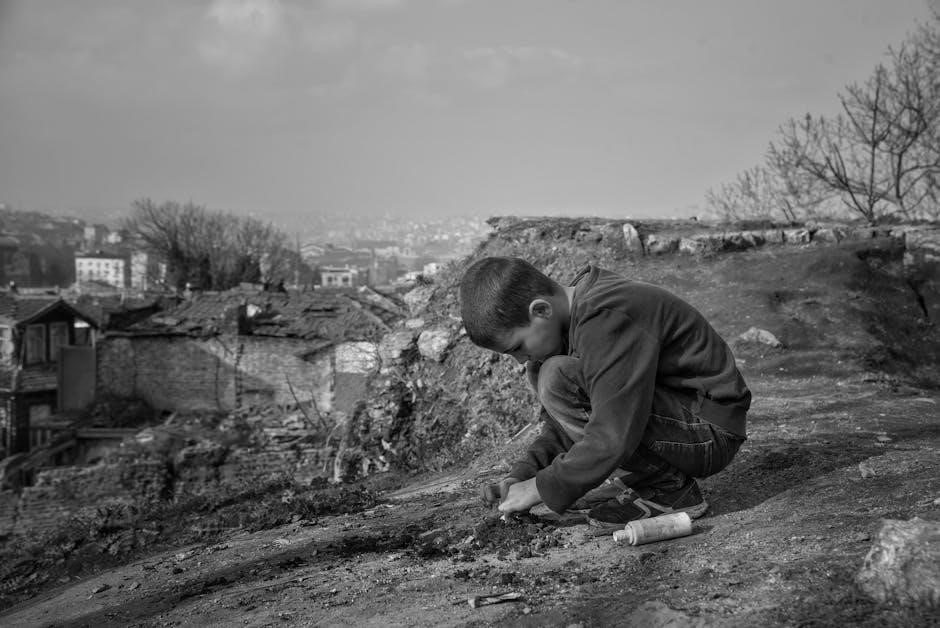
Staging and Performance History
Ruined premiered at the Goodman Theatre in 2008, directed by Liesl Tommy. Its European premiere followed at the Almeida Theatre in London, receiving critical acclaim.
8.1 Premiere at the Goodman Theatre
Lynn Nottage’s Ruined premiered at the Goodman Theatre in Chicago in 2008, directed by Liesl Tommy. Set in Mama Nadi’s brothel, the play vividly depicted the struggles of women in war-torn Congo, blending drama with music. This production marked the beginning of its critical acclaim, ultimately leading to its Pulitzer Prize win in 2009.
8;2 European Premiere at the Almeida Theatre
Ruined made its European debut at London’s Almeida Theatre, further solidifying its global acclaim. The production resonated with audiences, highlighting the play’s universal themes of survival and resilience. This premiere marked another milestone in the play’s journey, continuing its success beyond the U.S. and cementing its reputation as a powerful exploration of war’s impact on women.
Educational Resources and Study Guides
SparkNotes and critical essays provide in-depth analyses of Ruined, aiding students in understanding its themes and characters. The play’s PDF availability enhances accessibility for academic study and analysis.
9.1 SparkNotes and Critical Essays
SparkNotes provides detailed summaries, analyses, and discussion questions for Ruined, while critical essays explore themes like survival, gender, and war. These resources, available in PDF, offer insights into Nottage’s portrayal of women’s resilience, enhancing understanding for students and scholars studying the play’s complex dynamics and historical context.
9.2 Teaching the Play in Academic Settings
The PDF version of Ruined is widely used in classrooms, enabling educators to integrate the play into curriculum. Teachers often pair the script with study guides, fostering discussions on gender, war, and resilience. The play’s themes resonate deeply, encouraging students to engage with global issues through character analysis, reflective writing, and group discussions, enriching their understanding of social justice.
Quotes and Monologues
Ruined features powerful quotes and monologues that highlight the characters’ emotional depth and resilience. These excerpts are crucial for understanding the play’s themes and societal impact.
10.1 Significant Lines from the Play
In Ruined, Mama Nadi’s line, “This is a business, not a refuge,” underscores her pragmatism. Salima’s poignant words about her shattered life reveal the emotional toll of war. These lines resonate deeply, capturing the essence of survival and resilience in the face of unimaginable suffering.
10.2 Analysis of Key Monologues
Mama Nadi’s monologues reveal her complex duality as a brothel owner, blending toughness with a nurturing spirit. Salima’s haunting monologues expose her trauma, offering a raw glimpse into the psychological toll of war. These speeches highlight the play’s exploration of survival, resilience, and the moral ambiguities faced by women in conflict zones, adding emotional depth to the narrative.
Comparison with Other Works by Lynn Nottage
Lynn Nottage’s Ruined shares thematic similarities with her other works, like Intimate Apparel and Sweat, exploring themes of marginalization, resilience, and social justice through powerful character-driven narratives.
11.1 “Intimate Apparel” and “Sweat”
Lynn Nottage’s Intimate Apparel and Sweat explore themes of identity, race, and economic struggle, while Ruined delves into war’s impact on women. All three works highlight Nottage’s ability to craft compelling, socially conscious narratives through nuanced characters and settings, reflecting her dedication to amplifying marginalized voices across different contexts and time periods.
11.2 Nottage’s Exploration of Social Justice Themes
Lynn Nottage’s works, including Ruined, Intimate Apparel, and Sweat, consistently address social justice issues like race, gender, and economic inequality. Her plays humanize marginalized communities, shedding light on their struggles and resilience, thus fostering empathy and dialogue about systemic injustices and the strength of the human spirit in the face of adversity.
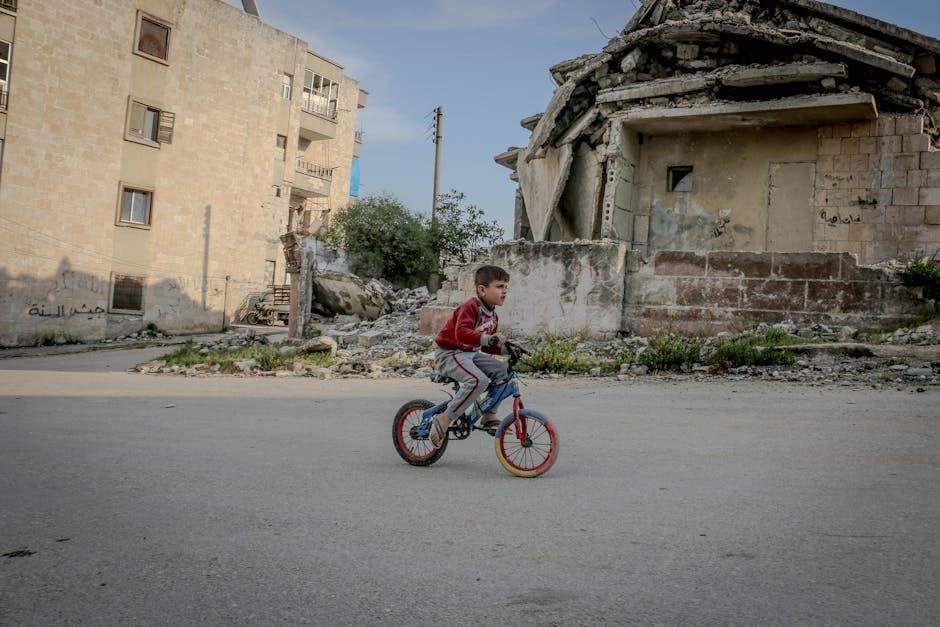
The Role of Music in the Play
Music in Ruined serves as a powerful form of emotional expression and resistance, blending African rhythms and songs to highlight the characters’ resilience and cultural identity.
12.1 The Use of African Rhythms and Songs
African rhythms and songs in Ruined create a vibrant backdrop, reflecting the characters’ cultural heritage and emotional depth. These musical elements serve as a form of resistance, offering solace and strength amidst the chaos of war, while also preserving their identities and communal bonds in the face of immense adversity and displacement.
12.2 Music as a Form of Emotional Expression
Music in Ruined serves as a powerful outlet for emotional expression, capturing the characters’ suffering and resilience. African rhythms and songs resonate deeply, reflecting their cultural identity and inner struggles. Through music, the women convey their pain, hope, and unity, transcending the brutality of war and fostering a sense of community and shared humanity amidst their shattered lives.
Ruined by Lynn Nottage leaves a lasting impact, highlighting women’s resilience in war-torn Congo. Its unflinching portrayal remains relevant today, sparking conversations on humanity and social justice.
13.1 The Lasting Impact of “Ruined”
Ruined continues to resonate globally, shedding light on the unspoken struggles of women in conflict zones. Its powerful narrative has sparked crucial conversations about gender, war, and survival, solidifying its place as a pivotal work in contemporary theater and social commentary.
13.2 The Play’s Relevance in Modern Times
Ruined remains a poignant reminder of gender-based violence and resilience, resonating with contemporary issues of human rights and war’s impact on civilians. Its exploration of survival and exploitation continues to spark vital conversations, making it a timeless piece for understanding the intersections of conflict and gender inequality in modern society.
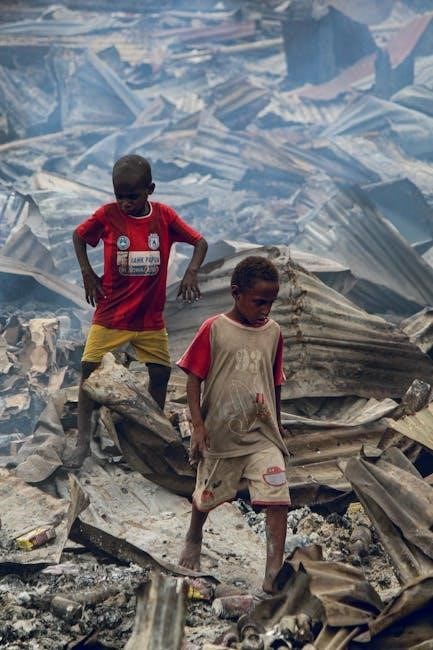
References and Further Reading
Find Ruined as a PDF online for in-depth study. SparkNotes offers critical essays, while academic articles provide analyses of Nottage’s work and its historical context.
14.1 Academic Articles and Reviews
Academic articles and reviews on Ruined delve into its themes of survival, gender, and war’s impact. SparkNotes offers critical essays, while scholarly journals analyze Nottage’s portrayal of women in conflict zones. Interviews with Nottage provide insights into her research and creative process, enriching understanding of the play’s historical and cultural context.
14.2 Interviews with Lynn Nottage
Lynn Nottage discusses her inspiration for Ruined in interviews, reflecting on her research in Congo and interactions with women affected by war. She shares insights into her creative process, emphasizing the importance of humanizing characters like Mama Nadi and Salima. Nottage highlights how she wove their stories into a powerful narrative, blending drama with real-life experiences to convey the play’s themes authentically.

